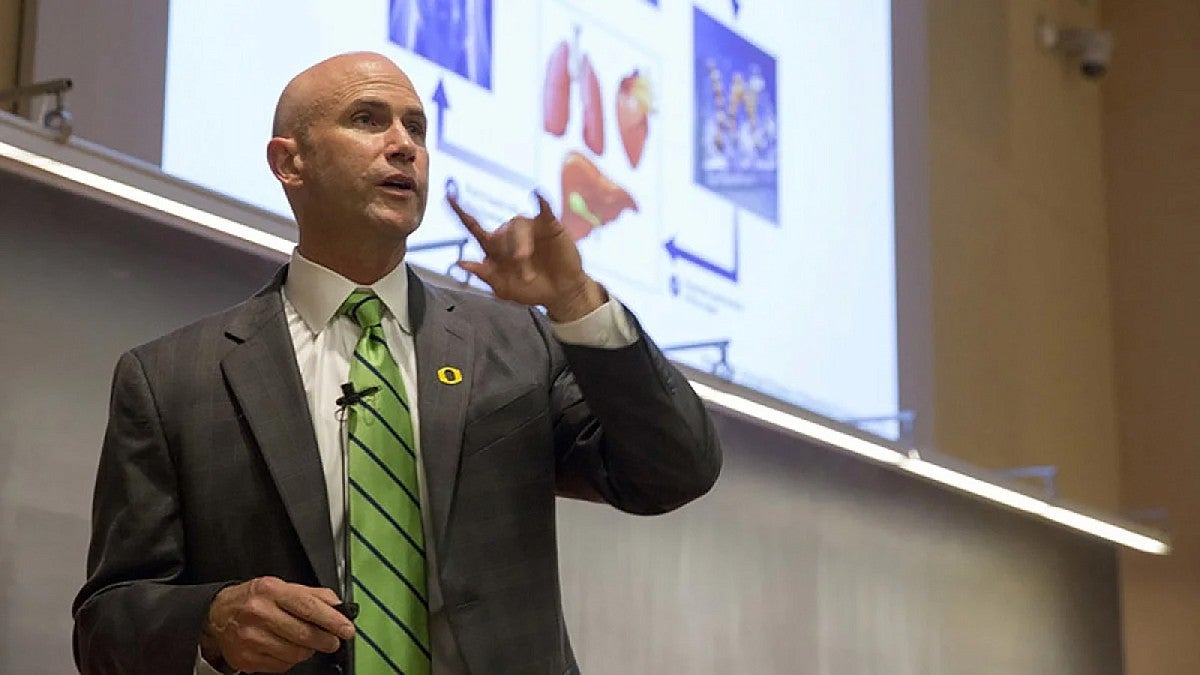Listen to your cells. That’s the message University of Oregon Vice President Robert Guldberg will deliver to thousands of people at TEDxPortland April 27.
The Leona DeArmond Executive Director of the Phil and Penny Knight Campus for Accelerating Scientific Impact is one of a dozen speakers marking the 12th year of an event with a mission to spread ideas. Guldberg will discuss musculoskeletal injuries and how monitoring cells in the blood may help patients heal.
“I'm grateful and honored that my colleagues nominated me to speak,” Guldberg said. “And I’m excited to share some of the work being done in the Knight Campus.”
Other speakers include Larry Miller, chairman of Nike’s Jordan Brand; Michael Curry, whose visual design projects include theatrical productions of “Frozen” and “The Lion King”; and Amber Huffman, principal engineer of Google Cloud. There will also be a performance by Modest Mouse, the Grammy nominated, multiplatinum Portland band.
Guldberg will discuss his research involving the search for an early predictive signature for poor healing outcomes. The strategy behind the science is to listen to and translate what the cells circulating in our blood are saying.
An adult human has more than 37 trillion cells of more than 200 different types, Guldberg said. And they’re constantly communicating. If we could decipher their conversations, what could they tell us?
Drawing on years of research in regenerative medicine and trauma immunology, Guldberg will discuss the model that he and his team developed to predict trauma outcomes. In 10 to 15 percent of cases, fractured bones fail to heal. Typically, the problem cannot be diagnosed until six to nine months after the injury.
Guldberg’s team found that there is a consistent signature of cells and proteins in the blood as early as one week after injury that can predict a poor healing outcome. He hopes the same approach can be used to give doctors a “weather report” on the patient’s outlook well before an X-ray would give an indication of healing.
Within a few years, Guldberg hopes, researchers will be able to develop machine learning models to help inform clinicians whether their patients are likely to heal or not, which may affect their treatment
Looking even further into the future, Guldberg said, researchers may develop new immune-system modulating therapies that are similar to what researchers are doing in the world of cancer research. The goal is to identify patients who are destined to have complications early, then provide them with personalized treatments that help them heal without the need for additional surgeries.
“This would be a game changer for orthopedic surgeons,” Guldberg said. “In addition to early intervention, a better understanding of how our immune system responds to injury could lead to new treatments.”
During the talk, Guldberg also will discuss new treatments for musculoskeletal injuries such as 3D printing and biomaterials.
“It’s such an important time to communicate the impact of science,” Guldberg said. “The TED platform reaches a lot of people. It’s important to communicate that science is moving quickly and translating into benefits for patients.”
TED talks began in 1984 when architect and designer Richard Saul Wurman and broadcast designer Harry Marks organized a conference in Monterrey, California. The first TED — which stands for “Technology, Entertainment, Design” — included a demonstration of the compact disc, an e-book and graphics by Lucasfilm.
Today, TED is a nonprofit organization producing hundreds of talks, podcasts and videos translated into more than 100 languages. The speakers cover myriad topics and have included Jane Goodall, Bill Gates and Stephen Hawking.
Around the world, local TEDx initiatives licensed by the national organization produce more than 3,000 events each year. Portland regularly draws crowds of several thousand, and the 2022 event at the Moda Center was the largest indoor TEDx event to date.
The UO has been a sponsor of TEDxPortland for 12 years, said Matt Roberts, associate vice president for community relations. As in past years, the university is the presenting sponsor for the 2024 event.
“Portland is among the top 10 TEDx organizations in the world,” Roberts said. “They have excellent speakers, high production values and huge turnouts. Other TEDx events look to Portland as the gold standard, and we’re thrilled Guldberg is on the roster.”
Over the last three decades, Guldberg’s research group has published 280 papers on musculoskeletal regenerative medicine, mechanobiology and orthopedic medical devices. Guldberg has co-founded six companies to translate his research into applications that benefit patients and was recently elected to the National Academy of Inventors.
In addition to being the UO’s inaugural executive director of the Knight Campus, Guldberg cofounded in 2020 the Wu Tsai Human Performance Alliance, a $220 million initiative to transform human health through the science of peak performance.
—By Ed Dorsch, University Communications


